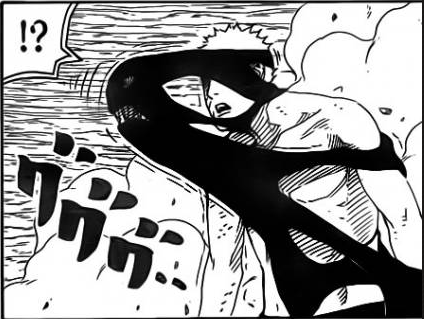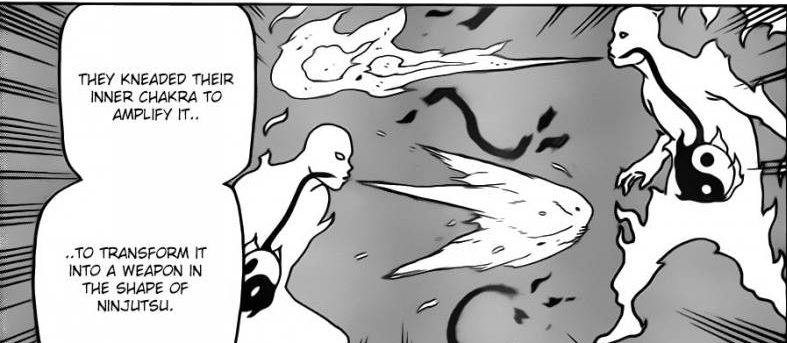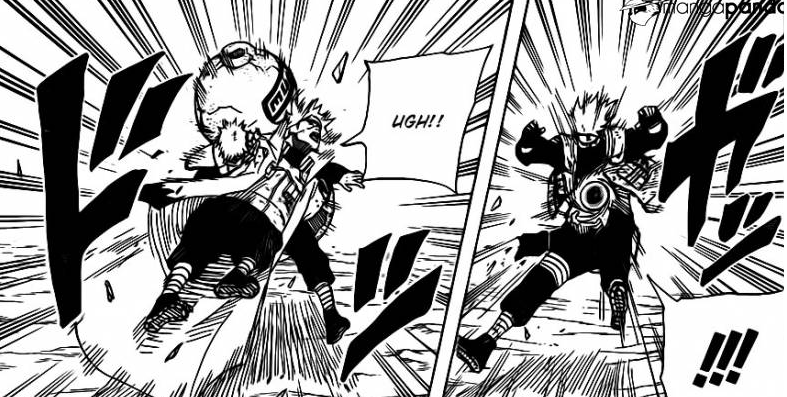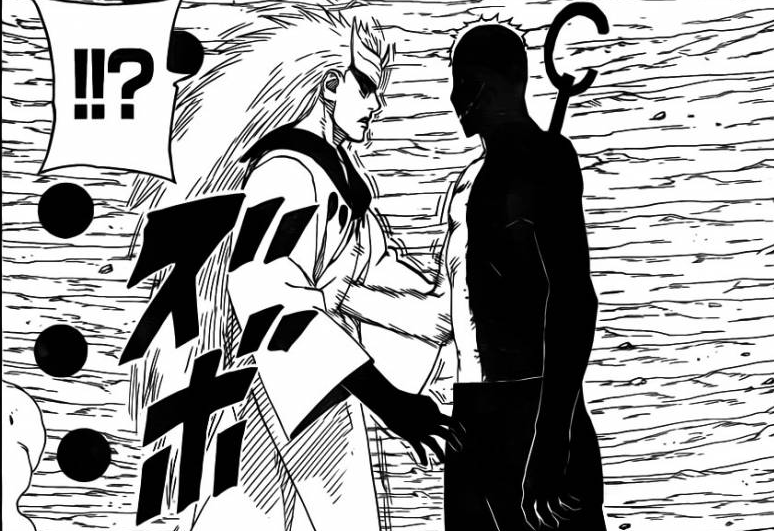Chapter 665: The Current Me
The chapter starts off with Black Zetsu trying to leave Obito's body so he can give the half of Kurama he stole, along with Obito's Rinnegan eye, to Madara. However, Obito keeps him from doing so, saying that he and Madara need to talk.

Obito asks Madara what he means to him, and Madara responds that Obito is simply a part of himself. "Madara" has become more than just a name for one man--it represents an ideology, and all who follow that ideology are "Madara." (Cult of personality much?)

Madara then goes on to explain more about the history of ninjutsu. The Sage of the Six Paths originally meant for chakra to be used to connect people to one another telepathically, so that they would have greater empathy and understanding for each other.

Instead, people used it to connect the physical and spiritual energies within themselves, giving rise to ninjutsu, which they used as a weapon against each other.

The Sage's ambition to use chakra as a way to end human conflict failed, and it instead became a source of even greater suffering. Madara intends to use Mugen Tsukiyomi to create a world without chakra. He tells Obito that Obito's power, too, failed him: he wasn't able to become Hokage or protect Rin. Obito's despair caused him to subscribe to Madara's ideals and thus to become part of "Madara." He tells Obito to come to him and calls him the savior of the world. Obito runs toward Madara, and at first it seems like he's going to willingly rejoin Madara and hand over his half of Kurama. Minato, Kakashi, and Gaara all try to stop him, but Madara negates all their efforts.

At the last moment, though, Obito betrays Madara, saying that he's not "Madara" but the Uchiha Obito who wanted to become Hokage.

So, the first thing I want to mention is that in the summary, I've put Madara's name in quotes when it's referring to his concept of "Madara" as an ideology rather than a single person, and left it alone when it's referring to the individual human known as Uchiha Madara. (I wonder if the original text differentiates the two by using different writing systems, like katakana vs hiragana?)
I liked the background we got on the reason why the Sage taught people how to use chakra. It actually reminded me of this series of books I read when I was a kid. The first one was entitled My Teacher is an Alien! and at the climax of the series, you find out that humanity used to be telepathic. But they gradually suppressed their telepathic powers when clans, tribes, and later nations went to war against each other, because the telepathy made it impossible to hurt anyone else effectively--you'd feel the same pain they did! The main characters of the book ask the aliens they're speaking with to send teachers to Earth to help humans rediscover these powers, thinking that this will bring an end to humanity's constant warfare. The Sage seems to have had the same sort of idea in mind: chakra would connect everyone to each other, allowing them to understand other people's feelings and motivations. This would of course make it much harder to dehumanize people from other countries and see them as just a faceless "other", as well as perhaps creating a more direct inhibition to violence through telepathic feedback like in the My Teacher is an Alien! series.
(I just imagine the Sage shaking his head sadly as people go around shooting fireballs at each other instead of communing peacefully and saying to himself, "This is why we can't have nice things.")
The theme of identity with Obito continues in this chapter. First, when he was disguised as Tobi, he claimed to be "no one." Then Naruto insisted ad nauseum that he was still Obito. Then Madara insisted that he's "Madara." Now Obito finally tells everyone else to STFU and decides for himself that he's Uchiha Obito.
Similarly, Madara talks about how his own identity has expanded beyond that of a single person to encompass all those who share his ideals. Of course, Naruto now has a whole lot of people subscribing to his ideals as well, so I almost wonder if the final battle isn't going to be so much Madara vs Naruto as "Madara" vs "Naruto"--a clash of the two competing ideologies, personified in their respective characters. It's almost like Naruto and Madara have both become archetypes rather than individuals.

Obito asks Madara what he means to him, and Madara responds that Obito is simply a part of himself. "Madara" has become more than just a name for one man--it represents an ideology, and all who follow that ideology are "Madara." (Cult of personality much?)

Madara then goes on to explain more about the history of ninjutsu. The Sage of the Six Paths originally meant for chakra to be used to connect people to one another telepathically, so that they would have greater empathy and understanding for each other.

Instead, people used it to connect the physical and spiritual energies within themselves, giving rise to ninjutsu, which they used as a weapon against each other.

The Sage's ambition to use chakra as a way to end human conflict failed, and it instead became a source of even greater suffering. Madara intends to use Mugen Tsukiyomi to create a world without chakra. He tells Obito that Obito's power, too, failed him: he wasn't able to become Hokage or protect Rin. Obito's despair caused him to subscribe to Madara's ideals and thus to become part of "Madara." He tells Obito to come to him and calls him the savior of the world. Obito runs toward Madara, and at first it seems like he's going to willingly rejoin Madara and hand over his half of Kurama. Minato, Kakashi, and Gaara all try to stop him, but Madara negates all their efforts.

At the last moment, though, Obito betrays Madara, saying that he's not "Madara" but the Uchiha Obito who wanted to become Hokage.

So, the first thing I want to mention is that in the summary, I've put Madara's name in quotes when it's referring to his concept of "Madara" as an ideology rather than a single person, and left it alone when it's referring to the individual human known as Uchiha Madara. (I wonder if the original text differentiates the two by using different writing systems, like katakana vs hiragana?)
I liked the background we got on the reason why the Sage taught people how to use chakra. It actually reminded me of this series of books I read when I was a kid. The first one was entitled My Teacher is an Alien! and at the climax of the series, you find out that humanity used to be telepathic. But they gradually suppressed their telepathic powers when clans, tribes, and later nations went to war against each other, because the telepathy made it impossible to hurt anyone else effectively--you'd feel the same pain they did! The main characters of the book ask the aliens they're speaking with to send teachers to Earth to help humans rediscover these powers, thinking that this will bring an end to humanity's constant warfare. The Sage seems to have had the same sort of idea in mind: chakra would connect everyone to each other, allowing them to understand other people's feelings and motivations. This would of course make it much harder to dehumanize people from other countries and see them as just a faceless "other", as well as perhaps creating a more direct inhibition to violence through telepathic feedback like in the My Teacher is an Alien! series.
(I just imagine the Sage shaking his head sadly as people go around shooting fireballs at each other instead of communing peacefully and saying to himself, "This is why we can't have nice things.")
The theme of identity with Obito continues in this chapter. First, when he was disguised as Tobi, he claimed to be "no one." Then Naruto insisted ad nauseum that he was still Obito. Then Madara insisted that he's "Madara." Now Obito finally tells everyone else to STFU and decides for himself that he's Uchiha Obito.
Similarly, Madara talks about how his own identity has expanded beyond that of a single person to encompass all those who share his ideals. Of course, Naruto now has a whole lot of people subscribing to his ideals as well, so I almost wonder if the final battle isn't going to be so much Madara vs Naruto as "Madara" vs "Naruto"--a clash of the two competing ideologies, personified in their respective characters. It's almost like Naruto and Madara have both become archetypes rather than individuals.